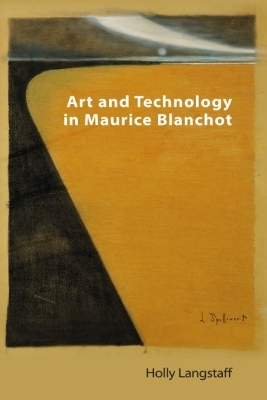
Maurice Blanchot
Art and Technology
Seiten
2023
Edinburgh University Press (Verlag)
978-1-3995-1547-4 (ISBN)
Edinburgh University Press (Verlag)
978-1-3995-1547-4 (ISBN)
Demonstrates Blanchot's ongoing importance for contemporary philosophical debate about technology, the post-human, and ecological thinking
Demonstrates a considerable shift in Blanchot's thinking from 1940s to 1980s
Highlights the significance of Blanchot for important figures of twentieth-century French thought such as Jacques Derrida, Michel Foucault, and Bernard Stiegler
Argues for the continued relevance of Blanchot to twenty first-century debates in literary theory and criticism
Holly Langstaff reappraises the influential French thinker Maurice Blanchot's writing from the 1940s to his late work in the 1980s, demonstrating how Blanchot's exploration of the question of technology remains decisive throughout his career.
She situates Blanchot's fictional and critical work in the context of his thinking of art as techne - as it develops out of Martin Heidegger's philosophy. While Blanchot follows Heidegger in the view that writing is a form of techne, he never appeals for salvation from the menace of technology in the modern era. Rather, he sees in all forms of technology the opportunity for a new way of thinking beyond value. This, Blanchot calls an entirely different sort of affirmation.
Demonstrates a considerable shift in Blanchot's thinking from 1940s to 1980s
Highlights the significance of Blanchot for important figures of twentieth-century French thought such as Jacques Derrida, Michel Foucault, and Bernard Stiegler
Argues for the continued relevance of Blanchot to twenty first-century debates in literary theory and criticism
Holly Langstaff reappraises the influential French thinker Maurice Blanchot's writing from the 1940s to his late work in the 1980s, demonstrating how Blanchot's exploration of the question of technology remains decisive throughout his career.
She situates Blanchot's fictional and critical work in the context of his thinking of art as techne - as it develops out of Martin Heidegger's philosophy. While Blanchot follows Heidegger in the view that writing is a form of techne, he never appeals for salvation from the menace of technology in the modern era. Rather, he sees in all forms of technology the opportunity for a new way of thinking beyond value. This, Blanchot calls an entirely different sort of affirmation.
Holly Langstaff is a Lecturer in French at St Edmund Hall, University of Oxford. She researches and teaches modern and contemporary French literature and thought. She runs the Warwick Prize for Women in Translation.
| Erscheinungsdatum | 21.10.2023 |
|---|---|
| Reihe/Serie | Technicities |
| Verlagsort | Edinburgh |
| Sprache | englisch |
| Maße | 156 x 234 mm |
| Themenwelt | Geisteswissenschaften ► Philosophie ► Metaphysik / Ontologie |
| Geisteswissenschaften ► Sprach- / Literaturwissenschaft ► Anglistik / Amerikanistik | |
| Geisteswissenschaften ► Sprach- / Literaturwissenschaft ► Literaturwissenschaft | |
| Sozialwissenschaften | |
| ISBN-10 | 1-3995-1547-0 / 1399515470 |
| ISBN-13 | 978-1-3995-1547-4 / 9781399515474 |
| Zustand | Neuware |
| Haben Sie eine Frage zum Produkt? |
Mehr entdecken
aus dem Bereich
aus dem Bereich
Buch | Hardcover (2024)
Matthes & Seitz (Verlag)
CHF 41,90
Über konstruktivistisches Denken in der Theologie
Buch | Softcover (2024)
Verlag Herder
CHF 79,95


